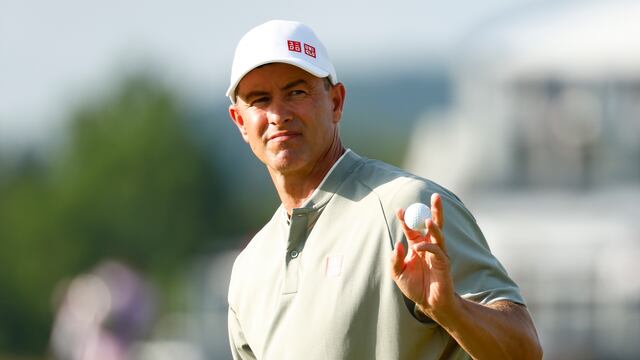Adam Scott and Viktor Hovland are two international players who could win at Oakmont on Sunday.

Beyond borders: Every international winner of the U.S. Open Since 2000

Golfing rivalries between American and non-American players are normally confined to the Ryder Cup or Presidents Cup on the men’s side of the sport, but it can also be interesting to take an alternative look at such rivalries through the prism of major championships, including the U.S. Open.
Four players remain under par
Only four players are currently under par going into the final round at the 2025 U.S. Open. Two Americans lead the way. Sam Burns (-4) and J.J. Spaun (-3) are at the top of the leaderboard. Adam Scott (-3) and Viktor Hovland (-1) are close behind.
2000 - 2024 US Open Winners
This century, the US Open has been won 11 times by players who were born outside of the US:
- 2001: Retief Goosen (South Africa)
- 2004: Retief Goosen (South Africa)
- 2005: Michael Campbell (New Zealand)
- 2006: Geoff Ogilvy (Australia)
- 2007: Angel Cabrera (Argentina)
- 2010: Graeme McDowell (Northern Ireland)
- 2011: Rory McIlroy (Northern Ireland)
- 2013: Justin Rose (England)
- 2014: Martin Kaymer (Germany)
- 2021: Jon Rahm (Spain)
- 2022: Matt Fitzpatrick (England)
2013 ➡ Matt Fitzpatrick wins the US Amateur at The Country Club.
— Sky Sports Golf (@SkySportsGolf) June 20, 2022
2022 ➡ Matt Fitzpatrick wins the US Open on the same course.
🤝🏆 pic.twitter.com/N1vSJ0Z0UN
Looking back over the history of the U.S. Open, which held its first competition in 1895, there are four periods that can be clearly subdivided according to the quantity (or lack) of international winners. The last two decades of U.S. Open winners, as seen above, have been equally divided between American and international golfers. Going back in time until the beginning in 1895, some different trends of US Open winners emerge according to nationalities.
1946- 1999 U.S. Open international winners
The US Open was not held from 1943 to 1945 due to World War II and going back from 1999 to 1946, only five victories came from players from outside of the United States:
- 1965: Gary Player (South Africa)
- 1970: Tony Jacklin (England)
- 1981: David Graham (Australia)
- 1994: Ernie Els (South Africa)
- 1997: Ernie Els (South Africa)
THROWBACK THURSDAY 🕰
— Golf Digest S-Africa 🇿🇦 (@GolfDigestSA) June 1, 2017
Ernie Els wins his second US Open title – Congressional CC, June 1997. #TBT pic.twitter.com/aySkddAzGG
1911- 1942 U.S. Open international winners
Prior to World War II, US golfers dominated their Open with only four foreign-born winners in the second period of the tournament:
- 1920: Ted Ray (Jersey)
- 1921: Jim Barnes (England)
- 1924: Cyril Walker (England)
- 1925: Willie MacFarlane (Scotland)
This era coincides with the domination of US amateur Bobby Jones, who won the US Open in 1923, 1926, 1929 and 1930. Another American Hall of Fame golfer from that time frame was Gene Sarazen, who won the US Open in 1922 and 1932 as well as other majors before the war broke out in Europe.
#USOpen In 1923 Bobby Jones wins the first of his four US Open’s at Inwood CC on Long Island. #golfcoursephotos pic.twitter.com/w6MB2SNr1u
— Evan Schiller (@Evan_Schiller) June 17, 2022
1895 - 1910 U.S. Open international winners
Related stories
The initial period of the US Open was dominated by foreign-born golfers. Players from Scotland (12), England (3) and Jersey (1) prevailed in the first 16 years of the tournament. Scottish-born golfer Willie Anderson is the only player to win four consecutive US Open titles (1901, 1902, 1903 and 1904). The only other players to win four US Opens over during their careers were American golfers Bobby Jones, Ben Hogan, and Jack Nicklaus.
Willie Anderson was a caddy from @NorthBerwick_GC, who emigrated to the US. He became the only man to win 3 straight @usopengolf titles and the first to win a total of 4. Only Bobby Jones, Ben Hogan and Jack Nicklaus have tied his record. Sadly, he died of epilepsy the age of 31. pic.twitter.com/0N7ONv5ioY
— Shanking Shots Historical Society (@ShankingShots) June 12, 2022
Since 1895, the US Open has been won 36 times by non-American golfers. Of those victories 16 were before 1910 and 11 have been since the turn of the millennium.


Complete your personal details to comment